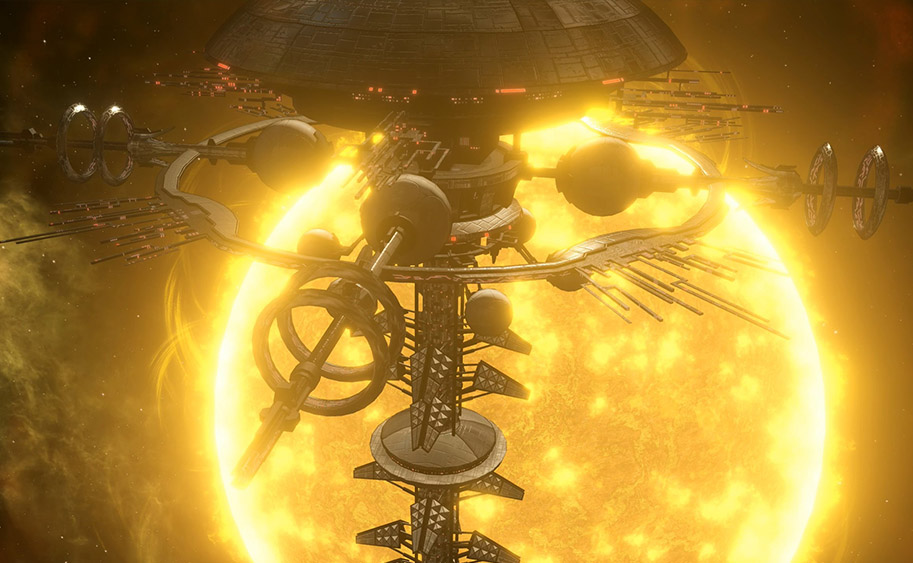Next to Cities Skylines, Stellaris is one of the most popular games Paradox Interactive publishes. The turn-based sci-fi strategy game, which lets players explore the reaches of space while competing with other aliens to build an empire, celebrated its one-year anniversary on Tuesday by releasing a set of free alien portraits that players can use as avatars alongside the Digital Anniversary Edition. The Anniversary Edition collects the core game, the Leviathans Story Pack, the Plantoids Species Pack, and April’s big premium expansion, Utopia in one package.
While previous expansions added story elements and aliens to the game, Utopia was the first premium add-on to emphasize Stellaris‘ core strengths by focusing on the customized development of the player’s empire. With it, players can decide on the kind of utopia they’d like to strive toward. Whether it’s a species of psychically linked citizens, a cybernetic race that’s out to conquer the galaxy (similar to the Borg from Star Trek), or something in-between, your utopia is out there. The expansion includes three different ascension paths to build toward along with megastructures like the Dyson Sphere (a structure built around a star to capture all its energy) to help players realize their dreams.

AListDaily sat down with Martin Anward, game director for Stellaris, to talk about what goes into making the perfect empire. “Utopia is an expansion where you can build the empire of your dreams,” he said.
Paradox named the expansion Utopia because it expanded on the ways the game could be played. “We wanted to add more play styles, since the game is very focused on expansion, which is very traditional for a 4X strategy game,” said Anward. “There has been a desire among the players for different ways to play. Some want to play as a fanatic pacifist, claim their space, and build a little utopia. This is what we wanted to focus on: ‘What is your view of your empire?’ This is one of the big strengths of Stellaris—the customization and imagining your empire whenever you play. We gave players more tools to do that with.
“You can have the vision [for an empire], but maybe it’s limited by the game mechanics. So, this was something that we wanted to build on, because it is the core strength of Stellaris. You don’t always want to just work on the weaknesses. You also want to take what works and make it even better.”
We asked Anward if it was difficult to re-engage with the player base when a new expansion released. “I think, generally speaking, we have generally good reception to our expansions,” said Anward. “There was a lot of excitement about Utopia, as there was with Leviathans. I think people know that the way we work is to launch free updates along with an expansion. So, even if you don’t pay more money, you get a better game. We put a lot of interesting and cool things into the expansions, but they’re optional. I think our fans appreciate that model and they really seem to be psyched about them as we keep expanding and building our game.”
Anward then detailed Paradox’s approach for spreading awareness of new expansions. “We typically keep up a high degree of communication with our fan base,” said Anward. “Obviously, we have social media, and we have our forums. We post weekly dev diaries where we go into detail about the mechanics that are coming. Generally, I think we have a pretty good reach with our gamers and we try to always have ongoing and honest communication with them about where the game is going, what we’re doing next, and what we’re focusing on.”
Is there any concern about expansions splitting players up? “One thing we have in Stellaris multiplayer is that you’ll always have access to all of the expansions that the host has,” he said. “That effectively means that there’s no splitting of the player base. If you’re playing multiplayer, you’ll have whatever the host has, and if you’re in single player, then it doesn’t really matter.”
Then there was the matter of how Paradox convinced players to pick up expansions on launch day instead of waiting for collected versions like the Digital Anniversary Edition to come out. “This might sound a little old fashioned, but you convince people by making a really good expansion,” said Anward. “If the features are, ‘holy shit, I’ve always wanted to do this!’ then you’re not going to wait. You’re not going to want to wait to get it.”
If some of the themes found in Stellaris seem a bit familiar, it’s not your imagination: Anward said popular sci-fi influenced the game a lot. “Our approach with Stellaris is kind of like taking every single sci-fi film and gathering them. For instance, we have something called Citizen Service in our civics options, where military service guarantees citizenship—a reference to Starship Troopers. We like to do that sort of thing because a lot of the people who play this game imagine their empire through the lens of pop culture. It might not be exactly like those empires, but someone might want to play in a republic where you have to fight to vote. If we give them that feature, they will be happy because they’ll be able to build that utopia.”
With the game officially celebrating its first anniversary, we asked Anward why he thought turn-based strategy games remained so popular when there were so many action titles on the market. “I think a lot of it is the sense of progression,” he said. “You start with this one little planet and one little settler. Then you explore, you discover, and you found your first city and encounter someone else. As you keep playing, the game sort of keeps playing with you. Things keep happening and you pass milestones. Then you sit there at the end of the game and look at your enormous, prosperous, wonderful empire and you know that all of it came from one little planet. That is a really good feeling.”
So, what’s Anward’s favorite ascension path from Utopia? “I actually like the psionic one the most, but I love all of them,” he said. “I really like turning my people into robots, and I love what you can do with the biological paths, where you can mold a species so that they no longer have feelings or have them live a very long time—completely mess with every single species in the galaxy. But I like the psionic one because once you complete the second stage, you contact this thing called The Shroud, which is another dimension where psionics come from. Then you can explore it and speak with the things there. You can even sign a deal with the devil—one of the spirits living there—and get all the benefits that may or may not turn out badly in the end.”
The Utopia expansion has loads of features, but what’s left to do after building the perfect empire? “Isn’t that the thing about utopia?” asked Anward. “It’s an unreachable goal. No matter how amazing your empire is, there’s probably always another place you want to go and another thing you want to achieve. That’s another reason why we called the expansion Utopia; we don’t think there is such a thing as a perfect empire. There’s always something more to achieve.”

